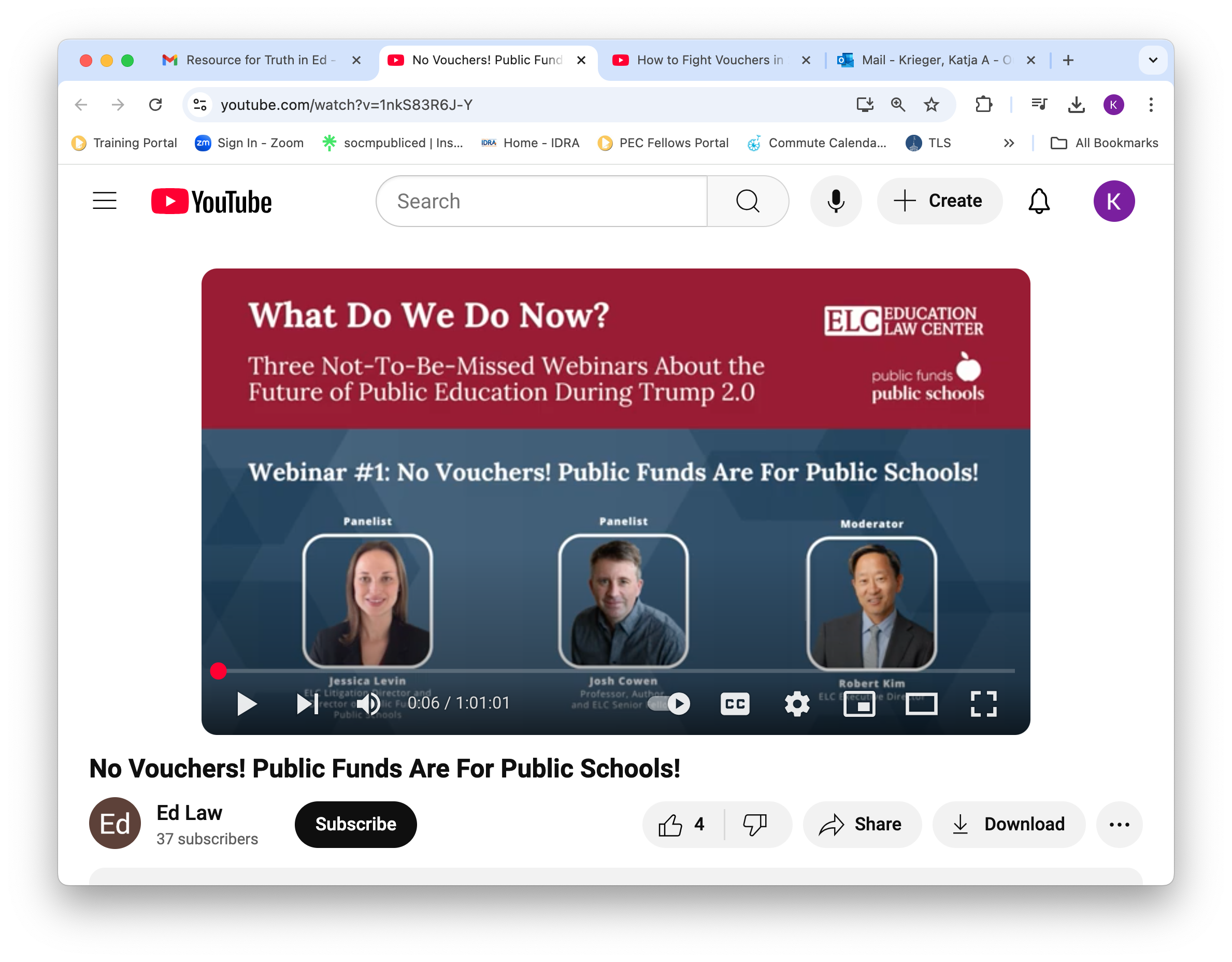ALL RESOURCES
FILTER BY TAG
Select a tag
- Academic performance
- Accessibility
- Accountability
- Advocacy
- Advocates
- Article
- Bill analysis
- Bill tracker
- Billionaires
- Blog post
- Civil rights
- Coalition building
- Community Schools
- Cost impact analysis
- Dark Money
- Data
- Disability
- Discrimination
- Drain funds from public education
- Education Savings Account (ESA)
- English language learners
- Fact sheet
- Fraud Waste and Abuse
- Graphic
- History
- Indigenous and Native Education
- Integration
- LGBTQ+
- Legislation
- Letter
- Litigation
- Messaging or talking points
- Model legislation
- National Voucher
- News
- Parents
- Personal narrative
- Podcast
- Policy brief
- Policymakers
- Radio
- Referendum
- Religion
- Report
- Rural communities
- Segregation
- Separation of church and state
- Slide deck
- Slides
- State Constitutional Right to Education
FILTER BY AUTHOR
Select an author
- Aaron Sanderford
- Alec MacGillis
- Allen Pratt
- Associated Press
- Bob Peterson
- Bruce Schreiner
- Catherine Caruso
- David Montgomery
- David Pepper
- Eli Hager
- Emily Walkenhorst
- Ethan Dewitt
- Geoff Mulvihill
- Hilary Wething
- Howard Fischer
- Jason Bailey
- Jessica Corbett
- Jim Collier
- Joe Dana
- Joshua Cowen
- Juan Perez Jr.
- Kiera Butler
- Laura Pappano
- Liam Amick
- Maurice Cunnningham
- Nora De La Cour
- Paige Masten
- Patrick Darrington
- Paul Hammel
- Phil Williams
- Rob Boston
- Robert Huber
- Rowan Moore Geretsy
- Sasha Pudelski

Federal Voucher Program – FAQs
The expansion of private school vouchers through the inclusion of a federal voucher scheme in the budget reconciliation bill passed in July is part of a broader assault on public education designed to privatize one of the most important common goods underpinning American democracy. Opting in to the federal program (the state’s choice), even to use voucher money for public education students, broadly endangers public education and opens the door to further voucher expansion, whether vouchers are already available in a given state or not.

States Must Reject Harmful Voucher Program
The federal voucher program contained in the budget reconciliation bill passed in early July will divert federal tax dollars from the U.S. Treasury and from services, including public education, that Americans rely on, to give to private and religious schools that pick and choose whom they educate and openly discriminate against some students and families.

Trump’s ‘Big Beautiful Bill’ Will Devastate Public Schools. America’s Kids Will Pay the Price
This week, Republican lawmakers are attempting to pass a budget reconciliation bill that pays for unprecedented handouts to the wealthiest Americans on the backs of cuts to programs that benefit most people. Hidden in this budget package before the House is a national private school voucher program funded through tax breaks for the wealthy that threatens to dismantle our system of public schools.

Judge rules Ohio’s EdChoice private school voucher program unconstitutional
A Franklin County judge has ruled that Ohio’s EdChoice school voucher programs are unconstitutional, delivering a victory to public school advocates and setting the stage for a likely appeal on a case over education funding in the state.

The School Voucher Debate – How School Choice Affects Low-Income Communities and Housing
The school choice movement, heavily supported by the Trump administration, aims to expand access to private and charter schools by redirecting public education funds through vouchers. These programs allow families to use taxpayer dollars to pay for private school tuition, but they come with serious consequences for public education, particularly in low-income and minority communities.

How vouchers harm public schools
The growing popularity of vouchers raises a host of crucial questions and concerns. Key to informing the debate are questions of public finance and education quality. Is allowing public money to leave the public school system and follow kids to private schools the most effective or equitable way to make sure every child has access to an excellent education? Our view is that it’s not. Public dollars allocated to education should go to boosting spending in public systems, not subsidizing private education.

Protect Public Schools: An Advocacy Toolkit to Fight School Voucher Programs
School voucher programs and their many iterations (education savings accounts, tax credits, etc.) drain funds from public schools while disproportionately harming Black and Brown students from low-income backgrounds and students with disabilities. This toolkit provides the resources and information communities need to launch effective advocacy campaigns against school voucher programs in their state.

A Conversation with ELC Senior Fellow Josh Cowen, Author of The Privateers: How Billionaires Created a Culture War and Sold School Vouchers (October 2024):
This PFPS webinar features Dr. Josh Cowen, Education Law Center Senior Fellow and professor of education policy at Michigan State University, in conversation with Maria Bautista of the NYU Metro Center about his new book, The Privateers: How Billionaires Created a Culture War and Sold Vouchers. The book provides a deep-dive investigation into education privatization covering a range of topics, including the origins of private school vouchers and the network of billionaire conservatives who have converged around the issue. It also highlights how vouchers are failing students and exacerbating income inequality, arguing that the advancement of privatization policies is an assault on public education as a defining American institution.

How Religious Schools Became a Billion-Dollar Drain on Public Education
The center had played a key role in bringing about one of the most dramatic expansions of private-school vouchers in the country, making it possible for all Ohio families—even the richest among them—to receive public money to pay for their children’s tuition. In the mid-nineteen-nineties, Ohio became the second state to offer vouchers, but in those days they were available only in Cleveland and were billed as a way for disadvantaged children to escape struggling schools. Now the benefits extend to more than a hundred and fifty thousand students across the state, costing taxpayers nearly a billion dollars, the vast majority of which goes to the Catholic and evangelical institutions that dominate the private-school landscape there.

No Vouchers! Public Funds Are For Public Schools!
Experts including Professor Josh Cowen, ELC Senior Fellow and author of The Privateers: How Billionaires Created a Culture War and Sold School Vouchers, and Jessica Levin, ELC Litigation Director and Director of Public Funds Public Schools, discuss the implications of Donald Trump's presidency on public schools and voucher programs.

North Carolina School Privatizers Are Subverting Democracy
Across the US, right-wing state legislatures have disregarded popular will to enact costly school privatization plans. In North Carolina, they flouted democracy to advance their agenda.

Ohio’s expanded vouchers are bleeding public schools that often outperform the private schools that benefit
Vouchers emerged in the United States as a tool to combat public school integration in southern states following the 1954 Supreme Court decision in Brown v. Board of Education. Led by Virginia, state legislatures provided public funds for white students to attend private schools — often referred to as “segregation academies.”
A new era of vouchers rebranded as “school choice” has swept the country in recent years, including Ohio, resurrecting segregation academies on wealth and racial lines.

Opposing Private School Vouchers:A Toolkit for Legislators and Advocates
This toolkit is designed as a resource to help legislators and pro-public education advocates oppose attempts to create new or expand existing private school voucher programs.
In recent years, a network of anti-public-education politicians and lobbying groups has been emboldened in its push for private school vouchers. Billionaires like the DeVoses, including former Education Secretary Betsy DeVos, the Kochs, and the Waltons are spending hundreds of millions of dollars on these campaigns. These funders are using their war chests to lobby for voucher bills in state legislatures, contribute to the political campaigns of pro-voucher candidates, and seed astroturf petition drives to put vouchers on the ballot.

PFPS Webinar Series
Public Funds Public Schools lists their series of webinars on school voucher programs with descriptions and links.

SOS Arizona Network Blog
This web page from Save Our Schools Arizona is includes blogs on Arizona’s voucher program.

NEPC Review: The Ohio EdChoice Program’s Impact on School District Enrollments, Finances, and Academics
A recent report from the Thomas Fordham Institute, The Ohio EdChoice Program’s Impact on School District Enrollments, Finances, and Academics, considers three possible harms associated with Ohio’s voucher program: to public school student outcomes through com- petition, to district financial resources, and increased racial segregation. Finding that Ohio vouchers have had few such harmful impacts, the report concludes that it has effectively dismissed the primary concerns of voucher critics. Yet, while the report is broadly methodologically sound for the narrow questions it poses, the questions it asks are out-of-date with respect to current concerns raised by voucher critics, which focus on substantially decreased student achievement among students using vouchers.

Keep Public Funds in Texas Public Schools
Private school voucher bills are being debated in the Texas Legislature again this year. An ever-increasing body of research shows that vouchers negatively affect student achievement, harm rural communities, exacerbate school segregation, promote discrimination, and undermine public school systems that welcome and serve all students. Texas public schools, which educate the vast majority of children, including the largest number of rural students in the country, remain starkly underfunded. Texas lawmakers must continue rejecting proposals for harmful voucher programs and instead use state resources to invest in public schools.

Let the Illinois “Invest in Kids” Private School Voucher Law Sunset
Illinois’ “Invest in Kids” tax credit voucher program is set to sunset after the 2023-2024 school year. This unpopular pilot program should lapse as intended in the law. Illinois should reject any attempt to extend the program or make it permanent, as well as any proposal to establish additional voucher programs. Instead, the state must invest in its underfunded public schools, which, unlike private schools, welcome and serve all students.

Facts About Vouchers
The National Coalition for Public Education has compiled a series of fact sheets on school voucher programs.

Studies and Reports
The National Coalition for Public Education has compiled studies and reports on school voucher programs.
